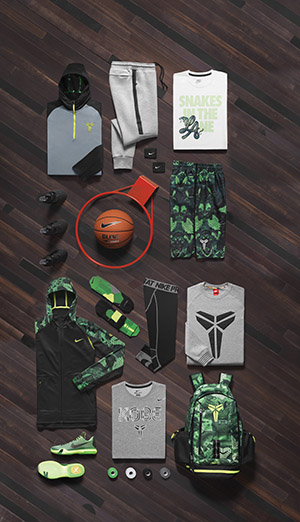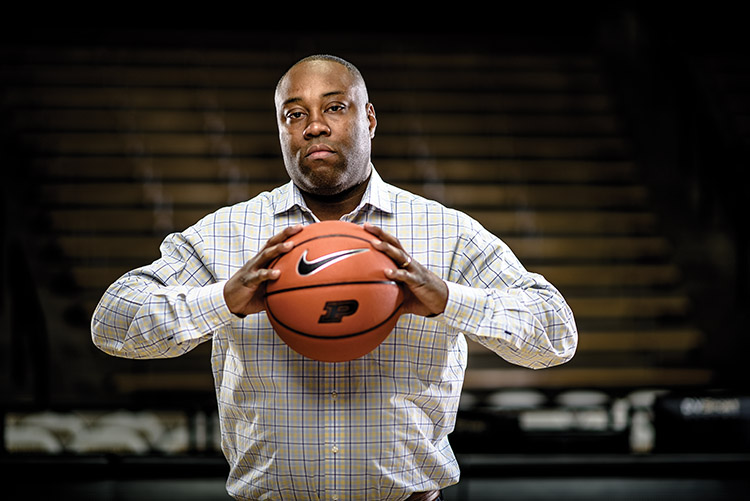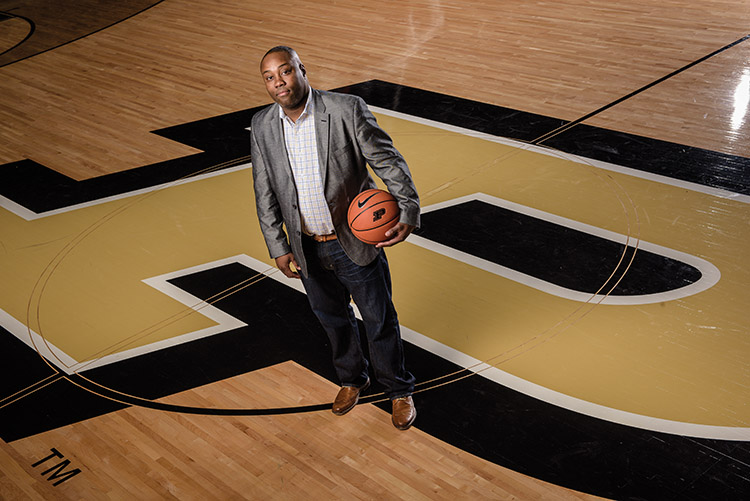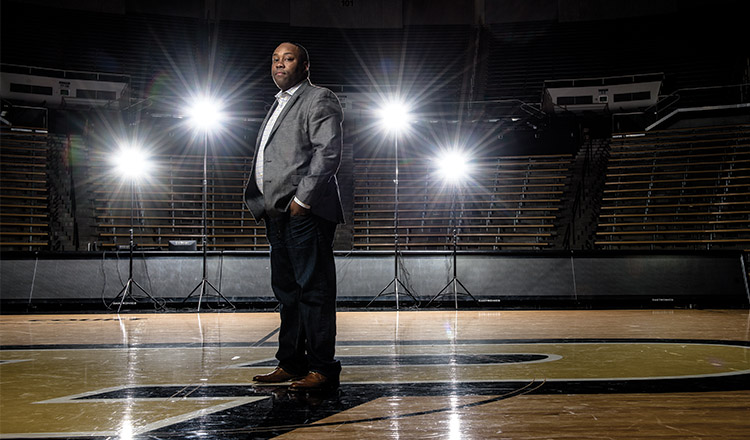As a kid in the ‘80s, Melvin Lenzy mowed lawns for five bucks apiece to afford his first pair of Nike’s Air Jordans, the iconic basketball shoes that changed the sports apparel industry forever. Many years later, while a student at Purdue, he worked at the Tippecanoe Mall’s Finish Line store, selling such products right off the shelves.
It might have been clear back in those days, then, what sort of path he was headed down. Today, Lenzy is again selling shoes, but on a much grander scale, as global brand director for Nike. In the big picture, though, Lenzy says, he’s selling inspiration.
“It’s about driving the voice of the athlete,” Lenzy says. “The athlete is inspirational, no matter what, because there are stories of life and success and failure in every athlete around the world.”

The voices Lenzy drives are influential ones. In his role at Nike — a nearly $30 billion company and the global leader in basketball by a wide margin — Lenzy leads branding efforts for one of the company’s signature stars of the past 10 years, Kobe Bryant, and will lead the branding efforts for what could be one of its signature stars of the next 20, Anthony Davis.
Bryant, a five-time NBA champion with the Los Angeles Lakers and currently the league’s No. 3 all-time career scorer, is winding down a legendary playing career.
Davis, a uniquely skilled 6-foot-11 forward from the New Orleans Pelicans and already one of the NBA’s top five players as just a 22-year-old, is just starting his.
It’s Lenzy’s job, too, to promote technological advances in Nike’s products to appeal to athletes’ sensibilities, but in a larger context, his goal is to appeal to consumers’ hearts, using the stories of the stars who put their names behind his company’s products.
Lenzy has worked personally with Bryant since around 2005, crafting his story as part of efforts to promote the last eight or so versions of his signature Nike shoes. This is no small task. Bryant’s reputation as a perfectionist extends well beyond the basketball floor, making him a demanding counterpart.
But that competitiveness and drive have been central in the message, particularly as the 37-year-old has persevered through major injury in past years. It’s in such stories that Lenzy seeks sources of inspiration, like the feelings stoked in him when he was young by Nike’s “Just Do It” campaign and other similar initiatives.
The easiest way to inspire people? Connect with them. Relate with them. If his career to this point is any indication — whether it’s been in the sports apparel game or the video game industry, domestic or abroad — that is what Lenzy does best.

Power of personality
It takes a certain type of individual to be able to instantly connect with people of all kinds and forge the sort of lasting bonds Lenzy’s story is full of.
People who know him best suggest he has found the perfect calling, a demanding, highly competitive job but one in which the ability to understand and get along with people is Job 1. Make no mistake here: Lenzy’s job is a high-profile one, and he is very well connected. He flaunts neither.
“He’s good at what he does because he’s not caught up in himself,” says Cuonzo Martin, a friend of Lenzy’s since they were Purdue students. “It’s hard for a lot of people to acknowledge somebody else is good, or to promote somebody else, because they’re caught up in themselves. In Melvin’s case, he takes pride in that. Whatever’s best for the team: that’s how he looks at it and that’s what makes him good.”
Martin, now the men’s basketball coach at the Nike-sponsored University of California, says Lenzy has always been a natural networker, someone who crossed seamlessly through different social circles in college.
“He’d be a great hype man,” Martin jokes. “If you’re feeling down, all you have to do is get with Melvin and he’ll lift you up. He just attracts people to him.”
That’s a common refrain among those who’ve known Lenzy. “He’s always been a high-energy, passionate guy,” says Brandon Brantley, an assistant basketball coach at Purdue and the man who can take credit for introducing Lenzy to his wife, Andy, while they were students at Purdue. “He has that infectious personality. I doubt anybody who’s ever met him has walked away saying, ‘I don’t like this guy.’”
Lenzy’s job is a high-profile one, and he is very well connected. He flaunts neither.
Lenzy could name-drop. A lot of people with his connections could. He’s worked with, and has a direct line to, some of the biggest stars in sports. Ask him about it, though, and you’re not going to get much in the way of bluster.
Mike Hawkins has been close with Lenzy since the two grew up across town from one another in Canton, Ohio, and played basketball against each other in school.
He remembers a conversation years ago in which Lenzy nonchalantly mentioned “having to meet Kobe in China.”
Hawkins burst out laughing. “I was fortunate enough to play in the NBA,” says Hawkins, who played three seasons in the league. “And I didn’t get to meet Kobe.”
Keeping current
You might say that the more he ages, the younger he gets. That’s been the nature of the 42-year-old’s line of work, whether it’s been at Nike or in previous roles in the video game industry.
It’s required him to not only understand youth culture and its ever-shifting landscapes, but also to immerse himself in it when need be. Social media has made it so much easier than it would have been just a few years ago. But you can only learn so much through a screen.
“A lot of the time, I just have to be in the streets, in the club, staying connected to music,” Lenzy says. “Any country I go to, it’s about figuring out where the spot is, then just going in and figuring it out, going to meet people and connect. Part of staying connected with youth culture is just understanding what’s changing, what new movements are. I’ve tried to do that, just to be an expert in what’s moving the pulse of youth culture.”
It’s of paramount importance at Nike, a company that puts such a premium on attracting young people to its brand, athletes or not.
It was of equal importance, obviously, during Lenzy’s stints at game-makers EA Sports and Konami, because if you can’t get kids to buy video games, chances are you’re not going to sell very many video games.
It was at EA Sports where Lenzy served as brand manager for the company’s Madden Football and NCAA Football games, two of the most prominent franchises in gaming. So those were big responsibilities, which Lenzy treated accordingly.
“Our biggest thing was getting Day 1 push,” he says. “We treated the Madden and NCAA games like movies. It was, ‘How can I promote this like a movie, so that when it launches Tuesday, the most people were buying my movie (then), like a movie release.’”

The first step
Lenzy’s success has been made largely by his penchant for bold action. It was evident early, and had it not been, his story might have turned out very differently, both professionally and personally.
He came to Purdue as part of Krannert’s Business Opportunity Program, which affords minority students interested in studying management an opportunity to knock out 18 credit hours worth of coursework during the summer prior to their freshman years, tuition-free.
Today, BOP, as it’s known, has turned out more than 1,200 graduates and currently boasts an 87-percent graduation rate, nearly double the national average for under-represented student populations.
Out of high school, Lenzy wanted in. Admittance to BOP, though, was a rigorous process, to put it mildly.
It started with Lenzy placing a phone call to Dr. Cornell Bell, the director for 37 years of the program he created. Lenzy didn’t graduate from Krannert, but nonetheless can be counted as one of the late Bell’s countless BOP success stories. It was Bell, essentially, who brought Lenzy to Purdue.
“I saw his name, so I just called him,” Lenzy says, remembering his unconventional admittance process. “I remember sitting at the kitchen table telling him what my grades were and what my test scores were and he was like, ‘Yeah, your scores aren’t good enough. We need stronger students than that. Sorry.’”
Lenzy was not a poor student in high school by any stretch of the imagination, but the program’s standards were high.
“The next week I called back: ‘Hey, Doc Bell, consider my application again, please,’” Lenzy says. “He said, ‘No, we need stronger students than you.’”
It wasn’t over. He called again. Then again. Then, finally, while in Lafayette visiting a relative, Lenzy visited Bell’s Krannert office, unannounced.
“I just showed up at Doc Bell’s door and said, ‘Remember that guy who’s been calling you all the time? I’m here now,’” Lenzy says. “About two weeks later I got admitted.”
Lenzy graduated from Canton South High School at the end of May and was in West Lafayette, fully admitted to BOP, a week later.

Success from failure
He’d studied. He’d definitely studied. But when Lenzy took his first test in Management 201, an accounting class, the result was, well, not good.
“I got a 7,” Lenzy says.
That day, he walked over to campus’s old Good Earth Market, when there was such a thing, to use its pay phone, when there were such things. He called home.
“Seven out of 10?” asked his father, also named Melvin. “That’s not bad.”
Out of 100.
“It wasn’t like I didn’t study,” Lenzy remembers, able to laugh about it now. “There were a lot of people around me who didn’t get an A. But they also didn’t get a 7.”
Lenzy may not have realized it at the time, but it was a pivotal juncture, the moment his academic career would change course. He was committed to Purdue, so he stayed, switching to sociology with the intent of attending graduate school or law school thereafter in hopes of working as a sports agent.
After graduation, Lenzy landed at Xavier University, where he earned his MBA and was reunited with Hawkins, his childhood friend from Canton. Hawkins played basketball for the Musketeers.
When he was signed to play for the Portland Trailblazers, he asked Lenzy to send him some suits. Lenzy did, tucking a résumé into one for his friend to pass along to the Blazers front office, beginning a series of events that landed Lenzy what he calls a “one in a thousand” job with the franchise, the launching pad for a career that’s spanned the globe, produced countless lasting relationships, and influenced some of the most recognizable brands in sports.
For a man who’s made his way in the world telling stories, it’s his own that’s become one very much worth telling.
Eastern Exposure
Not wanting to be pegged as merely a “basketball guy,” Melvin Lenzy forced himself out of his comfort zone and toward bigger and better things in 2008 when he urged his bosses at Nike to “challenge” him.
They did just that, assigning him to Taiwan to be the company’s director of marketing in the Asia Pacific region, consisting of about a dozen countries/territories, including much of China.
“I knew I had a window of opportunity, and I’m pretty adventurous,” Lenzy says. “The family might not have been too keen on it at the time, but looking back on it now, they have some fond memories and my sons (Braden and Max) have some strong relationships with people they met there and a different perspective. That’s what I wanted, too, for them to get the different experiences I never had.”
It was in China that one of the most memorable moments of Lenzy’s career around basketball occurred.
“The first time I went to Beijing, obviously I didn’t speak any Chinese, but I went to this court at DongDan Park,” he says. “Kids were playing and I just grabbed a basketball, motioned for a two-on-two (game), and we just played.
“Basketball doesn’t have a language. It’s universal.”

